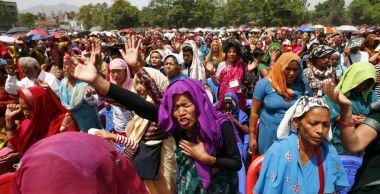Christians under threat in Nepal as anti-conversion law passed
An anti-conversion clause inserted into Nepal's new constitution was signed by the President yesterday, sparking concerns over religious freedom in the country.

The new constitution maintains that Nepal is a secular state and is neutral towards all religions but section 26 makes illegal "any act to convert another person from one religion to another or any act or behaviour to undermine or jeopardize the religion of another."
The new clause, which was passed by Nepal's Constituent Assembly (CA) and signed by the President is a violation of international treaties, Christian Solidarity Worldwide (CSW), a religious freedom charity said today.
"This fails to allow for choosing and changing one's faith to be seen as a positive individual choice or as a matter of individual rights, as required by international treaties which Nepal has signed and ratified," a statement from CSW read.
Nepal was declared a secular nation in 2008 by the CA, ending its status as the world's only officially Hindu state.
Despite official neutrality towards religion, bomb attacks on two churches in the Terai area in early September are suspected to be the work of radical Hindu groups after extremist Hindu pamphlets were found at the scene.
CSW's special ambassador Stuart Windsor highlighted fears about the persecution of minority religious groups in Nepal, including Christians who make up 1.4 per cent of the population according to the 2011 census.
"While we welcome the recent decision of the CA to maintain state neutrality towards all religions, it is vital that the anti-conversion clauses in the new constitution do not lead to the persecution of members of minority religions who wish to explain and discuss their beliefs with people of other faiths," he said.
Windsor also said he was concerned about the recent bomb attacks on churches and insisted the perpetrators must be brought to justice.











